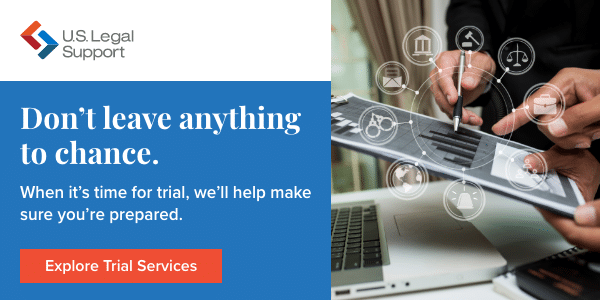Post-Trial Juror Interviews: Best Practices

In the American legal system, counsel is prohibited from speaking with the jury outside of a trial itself and the specific, structured ways they’re meant to interact. Practicing attorneys, law students, and most people with a passing familiarity of how courts work understand that this is the case and why—the potential for compromising fairness is simply too high.
However, counsel can interview jurors after verdicts are delivered, in some cases.
Post-trial juror interviews are an excellent way for law firms to gain valuable insights into a given trial and prepare for comparable ones in the future. But, to do so, they need to avoid breaking applicable rules or transgressing ethical expectations. Below, we break down how.
Why Conduct Post-Trial Juror Interviews?
The biggest reason legal professionals and law firms may want to talk to jurors is to understand their decision-making. Knowing the train of thought that led to a particular verdict, at least in one juror’s mind, can be extremely valuable for:
- Evaluating the strategy used in that trial
- Strategic planning for other matters with similar issues, jurors, or other factors
Another reason counsel might want to talk to jurors is to try to sniff out and address fairness issues. In some cases, this is the only reason post-juror interviews are allowed to happen.
Identifying Case Strengths and Weaknesses
First and foremost, post-trial juror interviews can help counsel understand the impact that overall trial strategy or individual decisions had on a juror. In situations where jurors are permitted to speak about their thought process (see below), these insights can allow legal teams to:
- Evaluate and change their strategies moving forward
- Confirm whether an attorney’s moves had the intended effects, irrespective of the ultimate outcome
When testing themes with a mock trial for future cases, these insights can inform the approach the legal team takes. They can also help attorneys build profiles and project the possible thought processes and decision trees their future jurors could experience.
Ensuring Fairness and Uncovering Potential Misconduct
Another critical reason legal teams might conduct post-trial juror interviews is to uncover any underlying issues that could potentially lead to a legal challenge. In some situations, this is the only valid reason to have a juror interview after the trial—all other purposes are prohibited.
Whether or not the juror interview needs to focus solely on grounds for a legal challenge, potential issues that arose during the trial are an excellent focal point for the discussion. The interviewer should address any issues with evidence, court procedures, the jurors’ overall understanding of their role, and other themes that could compromise sound proceedings.
Legal and Ethical Considerations for Juror Interviews
It’s absolutely essential to consult laws, precedents, and standards concerning post-trial juror interviews in a specific jurisdiction and courthouse before requesting, conducting, or even strategizing for them. This is because, in some places, these interviews might be explicitly prohibited or strongly discouraged. And, irrespective of what the rules are, judges have the ultimate authority to grant or disallow such contact between the counsel and the jurors.
In practice, there are two layers of restrictive and prescriptive material to consider—
Laws and Court Rules Governing Post-Trial Juror Interviews
Legal teams need to consult laws and precedents in the particular courtroom in which a trial is being heard to understand whether they can or should request post-trial interviews. State or other local rules can control whether an interview can happen and what can be asked.
For example, Florida’s Rule 3.575 stipulates that juror interviews are strictly for uncovering potential legal challenges to verdicts in criminal cases.1 Rule 1.431(h) applies a similar restriction to juror interviews in Florida civil cases.2 With respect to content, the interview can’t focus on a juror’s thought processes or anything inherent to the verdict, as statute § 90.607(2)(b) (2024) invalidates jurors’ competence to speak officially on such matters.3
Ethical Guidelines and Professional Conduct Considerations
Aside from applicable laws and rules, ethical standards and professional conduct expectations must be considered when requesting and conducting juror interviews.
To begin with, no juror, judge, courtroom professional, or other individual should be harassed or made to feel uncomfortable in any way. While legal teams may and often do re-send an initial request, they should stop short of repeating any communication ad nauseam. Likewise, consent and permission need to be affirmed both for conducting the interview and for any logistical or procedural elements introduced—don’t record, for instance, without asking first.
Best Practices for Post-Trial Juror Interviews
Beyond codified restrictions and the unwritten rules of sound business practice, there are also consensus best practices all legal teams should apply to post-trial juror interviews:
- Obtaining court approval – Legal teams should practice caution, asking judges for permission to interview jurors even if local laws do not explicitly require it. Being upfront about intentions and desired outcomes will maximize rapport and support.
- Structuring the interview process – Counsel should prepare a succinct list of the most pressing questions for their purposes, along with follow-ups. Asking too many questions or dwelling on an unimportant or uncomfortable topic should be avoided.
- Maintaining confidentiality and professionalism – All precautions should be taken to protect the juror’s privacy. This includes avoiding recording or transcribing (unless expressly permitted), along with anonymizing jurors’ answers to the extent possible.
Following these best practices will ensure the process is compliant and seamless for all parties while helping legal teams extract the most valuable insights from jurors efficiently.
Important Questions to Ask for Valuable Insights
Another best practice, if a more nebulous one, is making sure to ask the right questions for the kinds of insights a juror interview is trying to produce. This will depend heavily on:
- What kinds of things can be discussed
- The specifics of the trial and juror in question
Interviewers can open with general questions about the juror’s experience, such as how they felt about the trial or what their favorite part about it was. These openers help establish rapport and make the interviewer and interviewee feel comfortable with each other.
Then, diving into the trial proper, the legal professional should tailor their questions to how the juror perceived, interpreted, and reacted to specific elements thereof. For instance, asking “Which witness was most influential in your decision?” or “What did you think of [witness X]?” can allow the juror to speak honestly about the impact a specific testimony had on them.
How Post-Trial Interviews Support Future Cases
Insights from post-trial juror interviews can be used to challenge an existing case. Jurors can hint at ways they may have been influenced unfairly, or unsound procedures that were not uncovered during the course of the trial. These kinds of statements can substantiate appeals and other post-trial motions, letting legal teams recoup losses or retry a case more fairly.
However, these interviews’ impact on future matters is arguably even more important. Legal teams conducting post-trial juror interviews should ask questions that elicit transferable concepts to apply to future juror selection, trial presentation strategy, and more.
Refining Litigation Strategies for Future Cases
On one level, post-trial juror interviews can help legal teams understand what worked and what didn’t in their presentations—and why. Questions about particular pieces of evidence or witness testimonies can illustrate exactly what effect they had on an individual juror.
If multiple interviews are conducted, different jurors’ opinions can be triangulated to determine whether there is consensus. If the latter, legal teams can further analyze whether particular characteristics of jury members were associated with certain interpretations, opinions, or other takeaways.
This all informs the strategy for similar juries in the future.
Improving Jury Selection and Trial Presentations
On another level, post-trial juror interviews can help a legal team implement a strategic approach to jury selection. Analyzing juror responses can help legal teams understand correlations between composite jurors’ backgrounds, interests, and predilections with potential interpretations.
This means more accurate, educated guesses about how actual jurors might react in the midst of a trial presentation, which, in turn, informs selection.
Get the Most out of Post-Trial Juror Interviews
Ultimately, post-trial juror interviews present opportunities for legal teams to extract valuable insights from jurors. They help identify and address potential issues with a trial and provide strategic nuggets to optimize future trial strategies.
But to maximize the value of post-trial juror interviews, a careful approach—and, ideally, outside support—is required.
Our trial services division, TrialQuest, helps legal teams of all shapes and sizes prepare and execute legal strategies effectively. Our team can help you identify applicable rules and conventions, craft an interview strategy tailored to the case and jurors at hand, and extract its insights.
To learn more about our trial services and how we can help, get in touch today!
Sources:
- Casetext. Fl. R. Crim. P. 3.575. https://casetext.com/rule/florida-court-rules/florida-rules-of-criminal-procedure/the-verdict/rule-3575-motion-to-interview-juror
- Casetext. Fl. R. Civ. P. 1.431. https://casetext.com/rule/florida-court-rules/florida-rules-of-civil-procedure/rules/rule-1431-trial-jury
Casetext. Fla. Stat. § 90.607. https://casetext.com/statute/florida-statutes/title-vii-evidence/chapter-90-evidence-code/section-90607-competency-of-certain-persons-as-witnesses

Editoral Policy
Content published on the U.S. Legal Support blog is reviewed by professionals in the legal and litigation support services field to help ensure accurate information. The information provided in this blog is for informational purposes only and should not be construed as legal advice for attorneys or clients.


